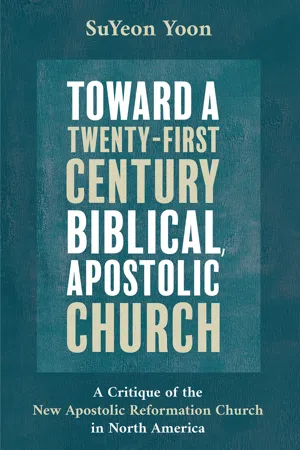
Toward a Twenty-First Century Biblical, Apostolic Church
A Critique of the New Apostolic Reformation Church in North America
- 230 pages
- English
- ePUB (mobile friendly)
- Available on iOS & Android
Toward a Twenty-First Century Biblical, Apostolic Church
A Critique of the New Apostolic Reformation Church in North America
About This Book
This book explores biblical values that critique the ecclesiology of the New Apostolic Reformation Church (NARC) and compares the ecclesiology to other missional movements in the North American context. A biblical exegesis of Ephesians 4:11-13 as well as C. Peter Wagner's conceptualization of an apostle and apostolic ministry allow the author to demonstrate the gap between the biblical perspective and Wagner's concept of an apostle. The biblical role of an apostle is to make the church missional by emphasizing the concept of sending, whereas Wagner sees the apostle as a church leader. Based upon interviews and participant observation in three NARCs, SuYeon Yoon describes the leadership and ecclesiology based on their own self-descriptions. This book then demonstrates the gap between the biblical and conceptual ideals and the reality of ecclesial practice. The author argues that the NARC serves as a charismatic manifestation of a similar cultural response to establish a relational structure for church communities that can appropriately reflect upon and identify with the contemporary context. This implies that each movement needs to be biblically sound, faithful to its conceptualization, and relevant to the context in order to cultivate its own way of being the church.
Frequently asked questions
Information
Biblical Overview of Apostleship and Its Ministry
The Understanding of Biblical Apostle and Biblical Ecclesiology
Table of contents
- Title Page
- Acknowledgments
- List of Abbreviations
- Foreword
- Introduction
- Part I: Biblical Overview of Apostleship and Its Ministry
- Part II: Case Studies
- Part III: Moving toward a Biblical Church in North American Context with a Broader Perspective
- Recommendations
- Appendix A: An Inquiry About “Apostolic Church Case Study”
- Appendix B: Case Study Cite: A Letter From C. Peter Wagner
- Appendix C: Record of Data for Semi-Structured Interviews
- Appendix D: Interview Questionnaire for Manna Church
- Appendix E: Interview Questionnaire for Michael Fletcher of Manna Church
- Appendix F: Interview with Mel Mullen
- Appendix G: Interview with Word of Life Church
- Appendix H: Interview with Rice Broocks
- Appendix I: Interview Questionnaire for Bethel World Outreach Center
- Appendix J: Interview Assessment
- Bibliography